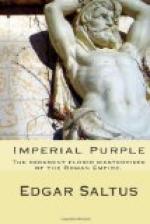Hadrian, captivated, led the lad in leash. The facts concerning that episode have been so frequently given that the repetition is needless here. Besides, the point is elsewhere. Presently the lad fell overboard. Hadrian lost a valet, Rome an emperor, and Olympus a god. But in attempting to deify the lost lackey, the grief of Hadrian was so immediate, that it is permissible to fancy that the lad’s death was not one of those events which the emperor-astrologer noted beforehand on his calendar. The lad was decently buried, the Nile gave up her dead, and on the banks a fair city rose, one that had its temples, priests, altars and shrines; a city that worshipped a star, and called that star Antinous. Hadrian then could have congratulated himself. Even Caligula would have envied him. He had done his worst; he had deified not a lad, but a lust. And not for the moment alone. A half century later Tertullian noted that the worship still endured, and subsequently the Alexandrine Clement discovered consciences that Antinous had reproached.
Antinous, deified, was presently forgot. A young Roman, wonderfully beautiful, Dion says, yet singularly effeminate; a youth who could barely carry a shield; who slept between rose-leaves and lilies; who was an artist withal; a poet who had written lines that Martial might have mistaken for his own, Cejonius Verus by name, succeeded the Bithynian shepherd. Hadrian, who would have adopted Antinous, adopted Verus in his stead. But Hadrian was not happy in his choice. Verus died, and singularly enough, Hadrian selected as future emperor the one ruler against whom history has not a reproach, Pius Antonin.
Meanwhile the journey continued. The Thousand and One Nights were realized then if ever. The beauty of the world was at its apogee, the glory of Rome as well; and through secrets and marvels Hadrian strolled, note-book in hand, his eyes unwearied, his curiosity unsatiated still. To pleasure him the intervales took on a fairer glow; cities decked themselves anew, the temples unveiled their mysteries; and when he passed to the intervales liberty came; to the cities, sovereignty; to the temples, shrines. The world rose to him as a woman greets her lover. His travels were not fatigues; they were delights, in which nations participated, and of which the memories endure as though enchanted still.
It would have been interesting, no doubt, to have dined with him in Paris; to have quarried lions in their African fens; to have heard archaic hymns ripple through the rushes of the Nile; to have lounged in the Academe, to have scaled Parnassus, and sailed the AEgean Sea; but, a history and an arm-chair aiding, the traveller has but to close his eyes and the past returns. Without disturbing so much as a shirt-box, he may repeat that promenade. Triremes have foundered; litters are out of date; painted elephants are no more; the sky has changed, climates with it; there are colors, as there are arts, that have gone from




